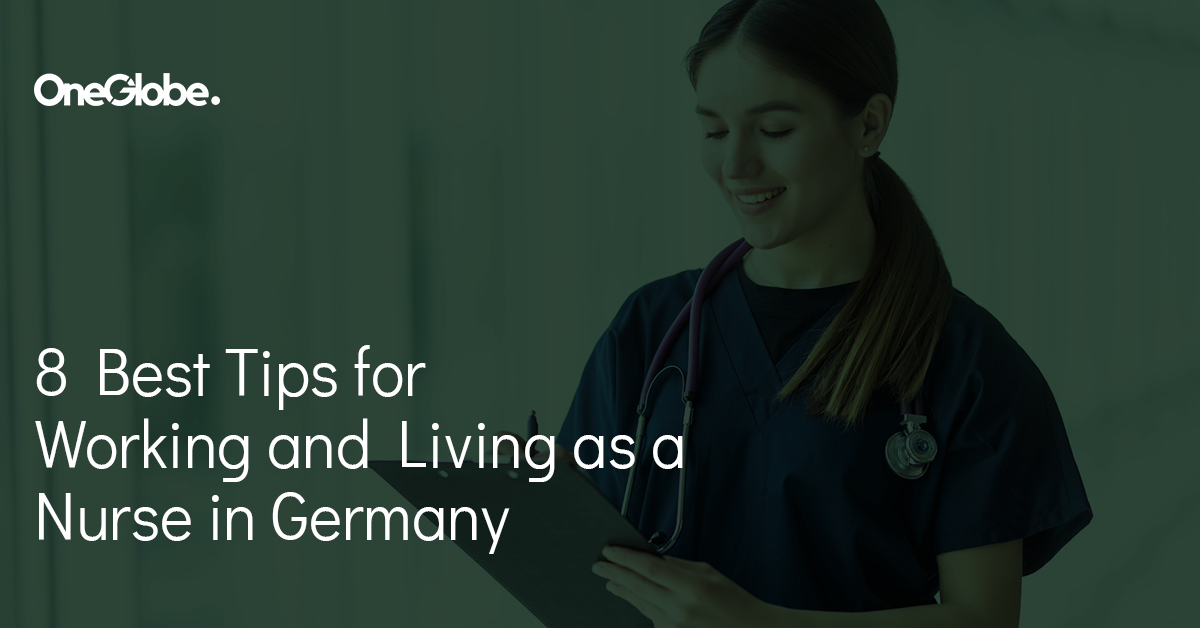
Deciding to move abroad is one of the biggest you’ll ever make. It’s why you should be doubly sure of where you’re going and what you’ll do there for a living. Germany has proven to be a great location of choice, whether you’re a healthcare nurse, a digital nomad, or a businessperson.
According to Destatis, 83.2 million people live in Germany as of January 2022. No matter where you come from or what your career plans are, there is a place for you within Germany. It’s why we’re here to discuss the best tips, and reasons, to live and work in Germany as a nurse. When you’re convinced to move abroad, you can use Jobs OneGlobe to apply for work and begin your new life in Germany.
Best Reasons to Move to Germany
Before we dive into practical tips and advice on living in Germany, let’s tackle some numbers to get a better idea of the country’s socio-economic status. According to Data Reportal, 77.5% of Germany lives in urban centers, with 22.5% living in rural areas. Germany is almost gender-equal in its population, with 50.6% of its residents being female and 49.4% being male. Germany is quite well-developed when it comes to infrastructure, various industries, commerce, and exported goods trade.
Its healthcare system is especially well-developed as the country lies at the center of the EU and serves as its central hub in many socio-political aspects. As a healthcare nurse, you’ll be able to find permanent employment and comfortable living conditions in Germany without any difficulties. Let’s list several great perks of living in Germany:
- Germany borders nine countries, making travel for work or vacation very easy and affordable. These countries include the Netherlands, Belgium, Denmark, Poland, Czech Republic, Switzerland, Luxembourg, France, and Austria.
- Germany has a very well-designed work/life balance for full-time employees, meaning that you’ll be able to tend to your family, hobbies, and other activities outside of working as a nurse.
- Learning German is essential for living in Germany but it’s also very easy once you move abroad. Wherever you work and live, you’ll pick up on German very easily thanks to your new colleagues, neighbors, and friends.
- Public transport within cities is of high quality compared to other EU countries, meaning that you don’t need to worry about buying a car whatsoever.
- Germans are very punctual and precise, which may come as a cultural shock to you. They’ll never be late for a meeting and you’ll always be able to rely on them.
- Germany features a great variety in cuisine and beverages, whether you’re a carnivore, omnivore, or vegan. You’ll never go hungry thanks to a wide range of supermarkets, restaurants, and takeout stores of all shapes and sizes.
Tips for Working and Living in Germany
1. Carry your Residence Permit/ID with You at All Times
As a nurse living and working in Germany, you’ll likely be issued a residence permit by local authorities upon moving. It is customary for everyone in Germany to carry their IDs or residence permit copies just in case. A police officer may ask to see your ID or you may run into a legal issue while outside and need to present your documents. Don’t rely on your smartphone and carry photocopies of your residence paperwork or original personal ID (if you’re an EU citizen).
2. Germany Has Various Hub Cities – Diversify your Selection
Germany has a somewhat different internal structure compared to what you may be used to seeing in other EU countries. The country is divided into different municipalities with their separate hub cities acting as epicenters for population growth. Some of the most populated cities in Germany are Berlin, Hamburg, Munich, Cologne, Frankfurt, and Stuttgart, each with its individual state.
This means that you’ll be able to live and work in any of these and other cities and feel as if you’re living in the capital. This is great for any healthcare nurse who prioritizes their job instead of geographic placement, as you’ll get an equally amazing experience in any city and healthcare institution within Germany.
3. Start Learning German Early to Acclimate to the Country Faster
While you may be able to get by in Germany without knowing German as a tourist, living there is another matter. Germans prefer it when people from abroad speak German, especially when it comes to working. This is why you should start learning German with OneGlobe Language Learning as early as today.
The tool will help you get into the habit of learning a new language daily through gamification and simple daily exercises. When you’re ready, you can reach out to a local language school and inquire about official German language certification for employment purposes. Until then, use OneGlobe Language Learning and get accustomed to German as a second language.
Start Learning GERMAN with OneGlobe Language Learning!
4. Buy a German SIM Card to Stay Connected
Living in Germany will require you to stay connected with colleagues from work and any friends you make along the way. Doing so is nigh impossible if you don’t own a German SIM card for your smartphone. There are several providers you can sign a contract with and get a package deal based on which phone features you use the most. Some popular options include:
- Vodafone
- O2
- 1&1
- Blau
- SmartMobil.de
You can either buy a SIM card from a store or a kiosk OR visit a local representative of whichever provider you chose to use. The latter option may be the best since you’ll be working and living in Germany as a nurse permanently, netting you the best value for money. Remember that you’ll have to present your ID and address of residence proof to whomever you wish to buy the SIM card from. This is done to prevent malicious misuse of SIM cards by German authorities, but it won’t be an issue for you as a permanent, fully-employed resident.
5. Familiarize yourself with your Neighborhood ASAP
When you get employed and move to Germany permanently, you should take the time to find out where it is you live now. Each neighborhood will have its nooks and crannies worth exploring in your early days abroad. This will give you a good lay of the land in terms of supermarkets, pharmacies, banks, dry cleaners, etc.
Knowing where everything is in your neighborhood will help you in emergencies, as well as when you need to buy groceries or withdraw cash quickly. You’ll also likely meet some of the locals more quickly this way, enabling you to integrate into society more easily as a nurse working abroad.
6. Bicycles are Great for Traveling Around the City
There are plenty of great ways in which you benefit from owning a bicycle in Germany. Germans are very keen on riding bicycles around cities, making them the number one preferred way of transportation. Almost every big German city is designed with cycling lifestyles in mind. You’ll be able to ride your bike to work as a nurse and not only stay healthy but also minimize pollution by cycling instead of riding the bus or driving a car.
You can either buy a new bike in a store or visit a local flea market for great bargains on used bikes. Make sure to try out several different models before you settle for the one for you, given your daily commute to and from work as a healthcare nurse.
7. Make Sure to Discuss your Health Insurance with your Employers
Health insurance is mandatory for everyone living in Germany. There are several different health insurance programs available based on the type of residence and employment you have in Germany. Being a nurse, you’ll either be eligible for state or private healthcare depending on the type of institution you work in.
Make sure to discuss this with your employers so that you’re sure of what to prepare for in terms of paperwork and health taxes. You won’t be able to go to a hospital or receive prescription medicine if you’re not insured, not to mention egregious prices of healthcare for uninsured individuals.
8. Use your Free Time to Visit Neighboring Countries
Given that Germany borders nine different countries, local transpiration companies have made it very easy for residents to travel to and from them. You can use your free time while working as a nurse to travel and explore new sights. You can go on vacation to Prague, visit Copenhagen, or go for a road trip to Amsterdam if you’re so inclined.
This means that you don’t have to strictly focus on work and create a healthier work/life balance for yourself instead. Traveling in your spare time will help you unwind, destress, and prepare for new career challenges in Germany’s healthcare system. Most importantly, it will let you learn about Europe, its history, landmarks, and the people who live in it.
Working and Living as a Nurse in Germany
Now that we’ve taken a good look at how it is to live and work in Germany, let’s discuss what you can do to get started as a nurse. Healthcare nurses are required to submit certain paperwork to their German employers when coming from abroad. Whether you’re from inside or outside the EU, the German healthcare system will require two very important items from you before you’re eligible to work in it:
- Bachelor’s Degree or higher in a healthcare-related field
- A2/B1 proficiency certificate in the German language
In addition to that, your employer will naturally ask you for your latest CV, contact information, and any references you may have. Knowing how to speak German is a must for working in Germany, especially as a healthcare nurse where you’ll have to speak to patients, doctors, and other healthcare staff. This is why there’s a strict policy on the prerequisites needed to become fully employed in Germany. If you cover these two elements, here’s how you can apply for work in Germany in a few simple steps:
- Create a candidate account on Jobs OneGlobe
- Create a CV with our professional CV builder and your latest information
- Browse the available healthcare nurse job listings on Jobs OneGlobe and apply
We’ve created a platform that will help you find work in Germany as quickly and as successfully as possible. You won’t have to wait long for a response from a prospective employer in Germany, so make sure you’re ready when you apply. Taking the first step toward a new life as a nurse in Germany is never easy – it’s why we’re here to help you out as much as possible.
Making the Decision to Move to Germany
The one thing you will need the most when moving to Germany as a nurse is a support system you can rely on. German employers are very understanding and welcome foreign professionals who want to work within their healthcare institutions. It’s why you’ll be well-taken care of by your future employers regardless of which state, city, or institution you land in. Prep your paperwork, apply for a job and start living the life you truly deserve as a professional healthcare nurse.




Share
Facebook
Twitter
LinkedIn
Telegram
Tumblr
WhatsApp
VK
Mail